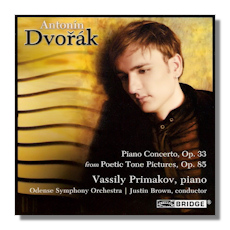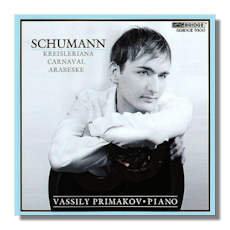
The Internet's Premier Classical Music Source
Related Links
-
Dvořák Reviews
Schumann Reviews - Latest Reviews
- More Reviews
-
By Composer
-
Collections
DVD & Blu-ray
Books
Concert Reviews
Articles/Interviews
Software
Audio
Search Amazon
Recommended Links
Site News
 CD Review
CD Review
Primikov Plays

Antonín Dvořák
- Piano Concerto in G minor, Op. 33
- Poetic Tone-Pictures, Op. 85:
- #1 "On the Road at Night"
- #3 "At the Old Castle"
- #8 "Goblin's Dance"
- #6 "Sorrowful Rêverie"
- #12 "At a Hero's Grave"
Vassily Primakov, piano
Odense Symphony Orchestra/Justin Brown
Bridge 9309 DDD 68:52


Robert Schumann
- Carnaval, Op. 9
- Kreisleriana, Op. 16
- Arabeske, Op. 18
Vassily Primakov, piano
Bridge 9300 DDD 71:41
Bridge is getting a lot of mileage out of its young star pianist, and well it should, because Primakov really has the goods. Many of his celebrated contemporaries are more flash than genuine fire. Primakov is a virtuoso and he isn't afraid to show it, but he is more than that: one feels that he has a point of view about the music that he plays, and that he has a personality that goes beyond his conservatory training. In that, he is not unlike his countryman Sviatoslav Richter, although given Primakov's tender young age – he was born in 1979 – it is far too early to tell whether or not his talent will develop to Richter-like proportions.
Funny I should mention Richter, because his recording of the Dvořák Piano Concerto is one of the work's finest, and has been at the top of most lists since it was released several decades ago. This work is not as popular as it deserves to be, mostly because it eschews technical razzle-dazzle in favor of a more poetic mood. It's almost like a more introspective version of the Schumann Piano Concerto. Many pianists have played and recorded a souped-up version by Wilém Kurz – one that supposedly makes the concerto more "pianistic." Primakov, on the other hand, joins Richter in returning to the original version, and he plays the composer's "original piano part almost in its entirety, with just a few slight modifications."
So what we have here is a Russian pianist, a British conductor, and a Danish orchestra playing a deeply Czech score, and doing it rather well, actually. I'm not going to suggest that Primakov and Brown are as distinctive as Richter and Kleiber – they are not. The present performers adopt a mellower approach to the score, and the result is an interpretation that has less drama and more poetry. As such, it is a very good reading, and the brightness and rhythmic vitality of Primakov's sound are very gratifying. Not a first choice, then, but certainly worth considering, and no disappointment for those who have been following Primakov's progress with interest.
In the Poetic Tone-Pictures Dvořák sometimes comes off as a Bohemian Edward McDowell. Here, Primakov's affectionate view of the music is even more appropriate than in the concerto, and one is left wishing that he had recorded the remaining eight pieces in the set as well. The pianist gives each of the five pieces its own character, yet there is no exaggeration.
The Schumann disc also was recorded in Denmark, approximately two months earlier. Most pianists with an international reputation get around to recording these works sooner or later. If sooner, they may be more likely to tap into Schumann's youthful spontaneity – after all, he composed all three of these works in the latter half of his twenties. If later, they may emphasize the visionary wisdom in these works, particularly in Kreisleriana.
Primakov's Carnaval is very clearly a young man's reading, full of fire and changeability. His tempos are not markedly faster than those of many other pianists – he requires 31:20 to play the entire score – but there is a skittish, even nervous brilliance here that, while it is not foreign to the music, is not the entire story either. Even the sophistication is edgy. For example, "Chiarina," a portrait of Clara Wieck (who not too far in the future would become Schumann's wife) is given a restless streak. This Carnaval, then, is more invigorating than elegant.
Nervous brilliance has its place in Kreisleriana too, although this is a more "private" score than Carnaval. Primakov plays the opening section with considerable freedom, alternately surging forward and holding back. He adopts a similar approach in all of the score's faster sections. He's not very different from many pianists in doing so, but the trick is to make it sound spontaneous, which Primakov doesn't always do. Even in the slower sections, one feels that Primakov isn't at rest; even if his fingers have slowed down, his brain is still whirring. The Arabeske receives the strongest performance on this CD, mostly because it sounds the most relaxed. (It is no less exciting, though.)
Primakov is an interesting and promising pianist, and while these two new releases don't eclipse the competition, they're hardly embarrassing. Primakov seems to be at his best when a moderating influence – e.g., a conductor – is present. His high-strung behavior when he is on his own probably is a function of his age, and I expect 20 years from now he will be asking us, as the old song says, to "blame it on his youth."
Copyright © 2010, Raymond Tuttle





















